Greetings Traveler!
These are some of the projects I have worked on:
Industrial Metaverse - Techdemo (2025)
Simulate an entire factory virtually and control real robot hardware in VR as a digital twin.
At the world’s largest industrial trade fair, Hannover Messe, weltenbauer.Software Entwicklung GmbH presented a tech demo that brings the Industrial Metaverse to life. In virtual reality, users can interactively adjust the welding points of a robotic arm — with changes instantly reflected on a real-world welding robot.
To deliver this immersive experience, we seamlessly integrated a range of cutting-edge technologies and hardware components:
Technologies used:
• Igus ReBeL Cobot (4 DOF welding robot)
• Data analysis via the Azure Digital Twin Portal
• VR planning using the Meta Quest 3
• Real-time visualisation of a "Virtual Factory" in Unreal Engine
• Live data communication through MQTT
• Interactive control via a 75″ touch table
Team: 5 Developers, 1 Artist, 1 Lead
Role: Developer
- Developed the VR interaction and control for a virtual robot arm synchronized with a physical counterpart using MQTT
- Built modular gameplay logic simulating dynamic production processes within a smart factory
- Sent real-time production data from Unreal Engine to a Docker-based analytics tool via MQTT communication
- Maintained automated CI build pipeline using TeamCity and created installers via Inno Setup
- Actively contributed to Scrum planning, internal documentation, and cross-functional coordination
[More]
https://weltenbauer-se.com/en/referenzen/virtual-factory-2/

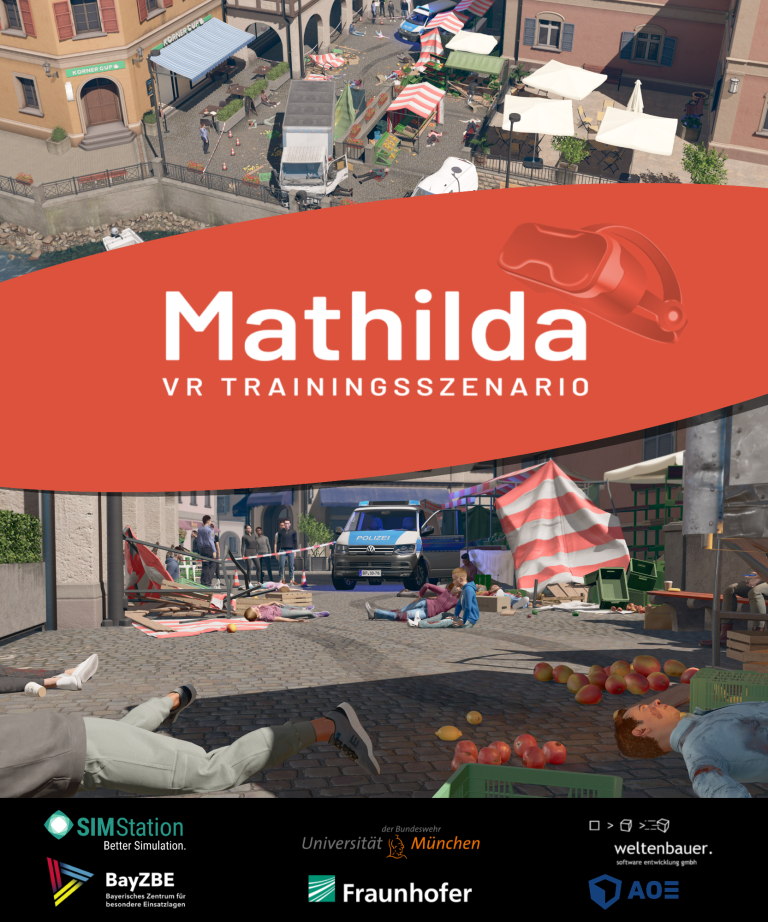

Project Mathilda (2024)
VR Training for Paramedics in Mass Casualty Incident Response
Project Mathilda is developed in cooperation by weltenbauer.Software Entwicklung GmbH, Bayerisches Zentrum für besondere Einsatzlagen gGmbH, SIMStation GmbH, AOE GmbH, the University of the Federal Armed Forces Munich, and the Fraunhofer Institute. The goal of the project is to create a VR simulation that prepares paramedics for real-life mass casualty incidents (MCI) in urban scenarios. This training simulates realistic terror scenarios and focuses on situational assessment as a learning objective.
The VR environment, developed using Unreal Engine 5.2, features full-body tracking in a space the size of a gymnasium. The simulation environment is designed as a PC-VR application for the Meta Quest 3. A core aspect of the project is the integration of stressors that challenge participants under various conditions. These stressors—including visual, auditory, and even olfactory stimuli via a specially developed micropump from the Fraunhofer Institute—can be configured and managed through a WebApp. This WebApp allows a trainer to create VR scenarios and monitor the paramedic's performance during the training. Communication between the systems (WebApp, VR environment, micropump, etc.) is implemented via REST-API, WebSocket, and WebRTC.
Additionally, research data is collected over the LabStreamingLayer network for analysis, providing insights into participants' behavior and performance under stress conditions.
Team: 4 Developers, 1 Artist, 1 Lead
Role: Developer (with occasional client representation)
- Implemented an in-game event system and logic to trigger psychological stressors for experimental research
- Developed a REST API and WebSocket-based communication pipeline between Unreal Engine and a web application
- Integrated LabStreamingLayer into Unreal to broadcast experimental data to the network in real-time
- Worked on multiplayer networking to synchronize multiple Unreal Engine instances within the same environment
- Implemented the gameplay logic for scent zones in Unreal and built a custom Python WebSocket server for hardware control of a scent pump
- Contributed to Scrum-based planning, documentation, and client meetings
- Set up CI build steps including SBOM (Software Bill of Materials) generation
[More]
https://weltenbauer-se.com/en/referenzen/project-mathilda/
MR-Chess (2022-2023)
A Mixed Reality Chess Experience for Meta Quest Pro and Quest 3
MR-Chess is a chess project that uses mixed reality (MR) integration to enrich the chess experience. The application was developed specifically for Meta Quest Pro and Meta Quest 3 and is based on the Unity game engine. It uses hand tracking and passthrough technology to create a unique gaming experience.
In the MR-Chess application, mixed reality is cleverly used to combine real and virtual elements. Digital elements such as the virtual playing partner and animated chess pieces are integrated into the users' real environment. This allows users to play either on a physical chess board with real pieces or in a completely digital environment, depending on their preferences. This opens up a variety of chess possibilities, combining both traditional and modern aspects of the game.
A particular focus in this project is on creating authentic interactions. After calibrating the physical chessboard, the user interface is displayed on this real table, transforming it into a smart screen. In experimental mode, users have the opportunity to play on a physical chessboard, allowing them to enjoy the haptic chess experience by feeling and naturally moving the chess pieces without relying on controllers.
MR-Chess offers users the flexibility to play against either friends or AI opponents with different levels of difficulty.
Based on an idea by Fabian Rücker of XR Consulting Rücker in collaboration with Weltenbauer Softwareentwicklung GmbH, the app was developed by a team of seven developers and published in the Meta App Lab.
Team: 3 Developers, 1 VR-Consultant, 1 Lead
Role: Developer
- Visualized real-time chess gameplay in 3D based on data from the Lichess API
- Calibrated the virtual chessboard for mixed reality alignment within a physical space
- Integrated Photon multiplayer for synchronous gameplay between devices
- Implemented basic VR hand-tracking gestures and interaction logic for intuitive piece manipulation.
- Participated in agile planning and iterative prototyping cycles
[App-Store]
https://www.meta.com/de-de/experiences/7090084851052034/
[More]
https://mr-chess.com/
https://xrconsultingruecker.de/mr-chess/
https://mixed.de/mr-chess-ausprobiert/
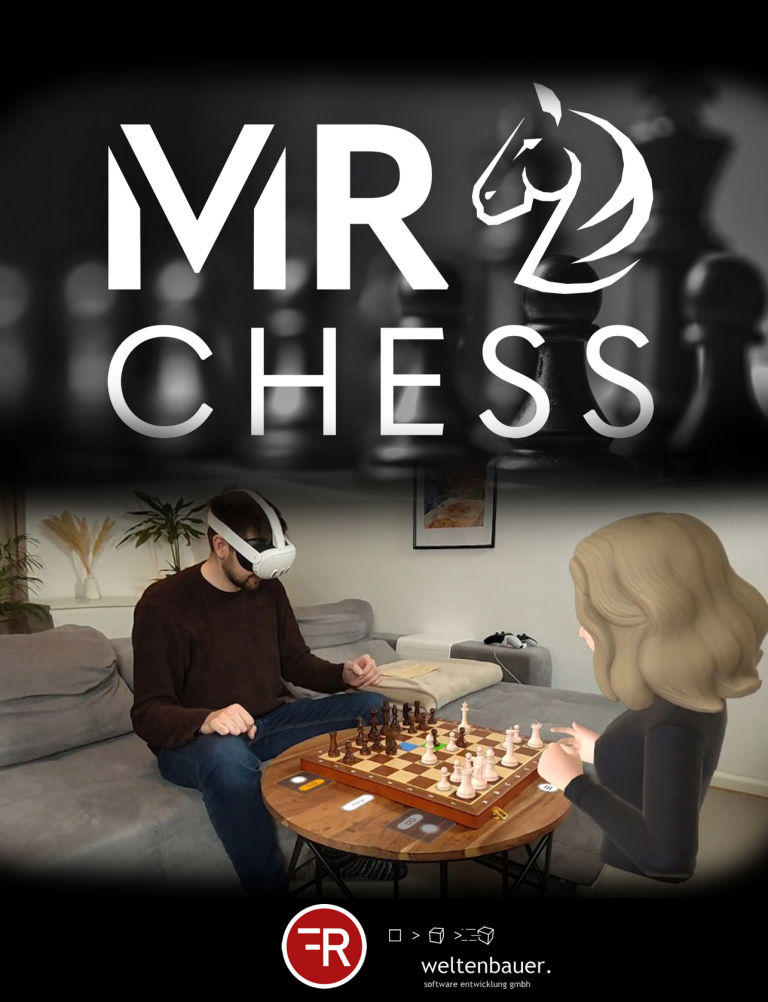
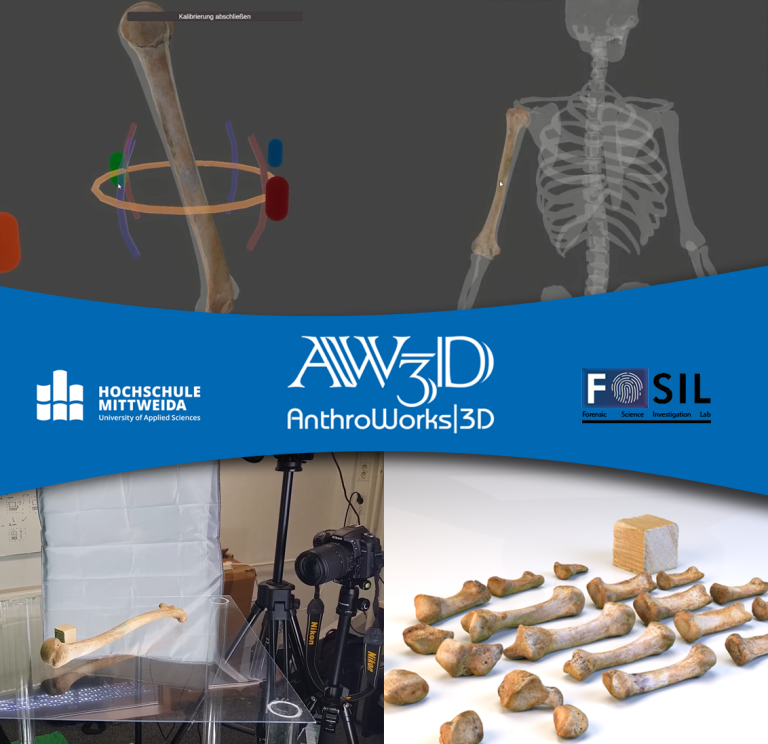
AnthroWorks3D (2021-2022)
Virtual Osteology Research through 3D Scanning and Game Development Techniques
In anthropology, physical remains of people from historical and recent periods are examined with the aim of revealing their circumstances. The AnthroWorks3D project at Mittweida University of Applied Sciences combines methods of video game development and osteology to gently digitise the bone material in high resolution through a 3D scan pipeline and to measure it virtually, independent of location and in parallel. The aim is to minimise wear and tear on the bone material and make the findings accessible to as many researchers as possible. The Game Engine Unity was used to develop a virtual research environment to study the digitised material.
Team: 2 Developers, 1 Forensic Anthropologist, 1 Bioinformatician
Role: Developer
- photogrammetry pipeline
- custom 3D model importer on runtime
- Developed in-app annotation and measurement tools for scientific workflows
- Designed movement/UI tools for immersive manipulation and inspection of bone models
- technical planning
[More]
https://monami.hs-mittweida.de/frontdoor/deliver/index/docId/12284/file/FritzschHanjoTim_eingebettet.pdf
https://www.forschung.hs-mittweida.de/news/aktuell/6790/?logintype=login&pid=496
https://www.youtube.com/watch?v=EAJsH24poAQ&list=PLe0SQlxCvTuJSMJJP2BCu5X9yyikYPK7T&index=2
Cultural Discovery (2022)
An Interactive 3D Journey through Digital Exhibits
Cultural Discovery is an interactive virtual journey through an exhibition of 3D digital objects from various disciplines. The prototype was developed during a 4-week sprint phase of the first Cross-NFDI Hackathon "Creating New Dimensions" and won the category "Greatest Diversity".
Users can move through a 3D street festival in first-person perspective and discover many exciting exhibits. Furthermore, the objects can be examined more closely in an isolated view and can even be annotated. The prototype was developed with Unity3D for Windows. The aim is to bring together data from different institutions and present them creatively. The digital objects were combined with gamification elements. These include quests, conversations and puzzles. The aim is to arouse users’ interest in the physical exhibitions and in the data itself. At the same time, the disadvantages of a physical exhibition, such as the different locations and the often-missing direct interaction with the exhibits, are to be avoided.
Team: 2 Developers
Role: Developer
- Optimized 3D assets for performance and interactivity in a festival prototype
- Designed level layout and implemented core interaction systems and gamification element
- Led technical planning and architecture during a fast-paced hackathon environment
[More]
https://hackdash.org /projects/634585af6d202d739f69ce71
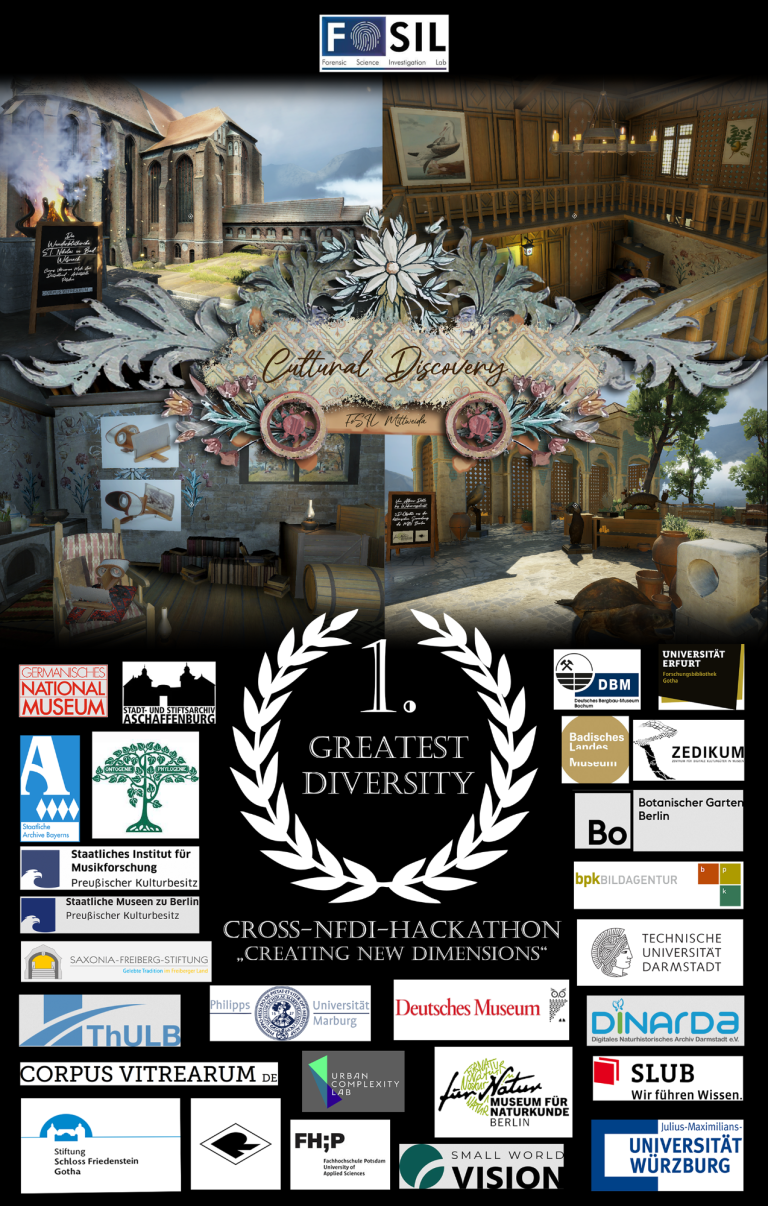
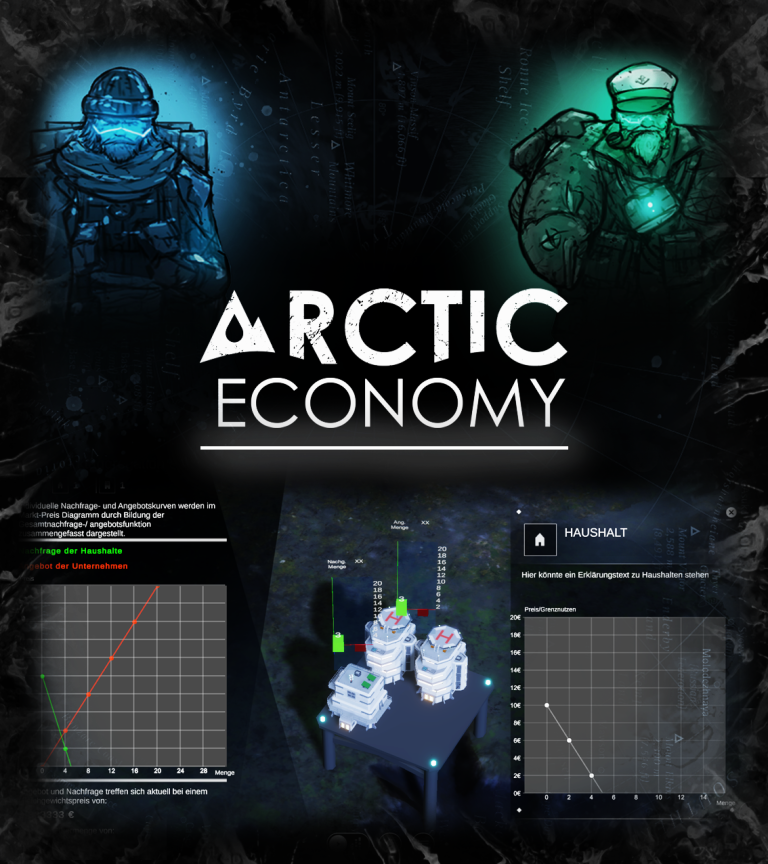
Arctic Economy (2020-2021)
Game-Based Learning through Economic Simulation in Antarctica
Arctic Economy is a research project at Mittweida University of Applied Sciences in the field of digital game-based learning. The aim is to create an evaluation framework that enables a scientific assessment of the efficiency of selected game design elements on the learning success of the players. The implementation is in the style of an economic simulation in which the players/learners are faced with the challenge of establishing a functioning economy in Antarctica to preserve humanity. The implementation was done with the game engine Unity3D.
Team: 1 Game Designer, 2 Developers, 1 Artist, 1 Economist
Role: Developer
- Implemented a simulation-based learning environment visualizing economic KPIs in a 3D space
- Implemented building placement mechanics, agent-based pathfinding, and economy logic
- Collaborated on game design and planning of simulation logic and player progression
MANA (2019-2020)
Team-Based VR Wizardry in a Competitive Magical Arena
MANA is a team-based, competitive virtual reality game in which teams of two fight each other as wizards in a magical arena with the aim of conquering the battlefield. In the process, the players must execute their spells and ward off enemy spells with the VR motion control.
The game was developed by 40 developers over two semesters as a final project of the MI17 matriculation course in "Media Informatics and Interactive Entertainment - Bachelor" at Mittweida University of Applied Sciences.
Role: Mainly 3D-Artist
- Created stylized 3D environment assets through sculpting, texturing, and retopology
- Focus on efficient real-time rendering and asset optimization
[More]
https://games-studieren.hs-mittweida.de/beitrag/beta/mana/
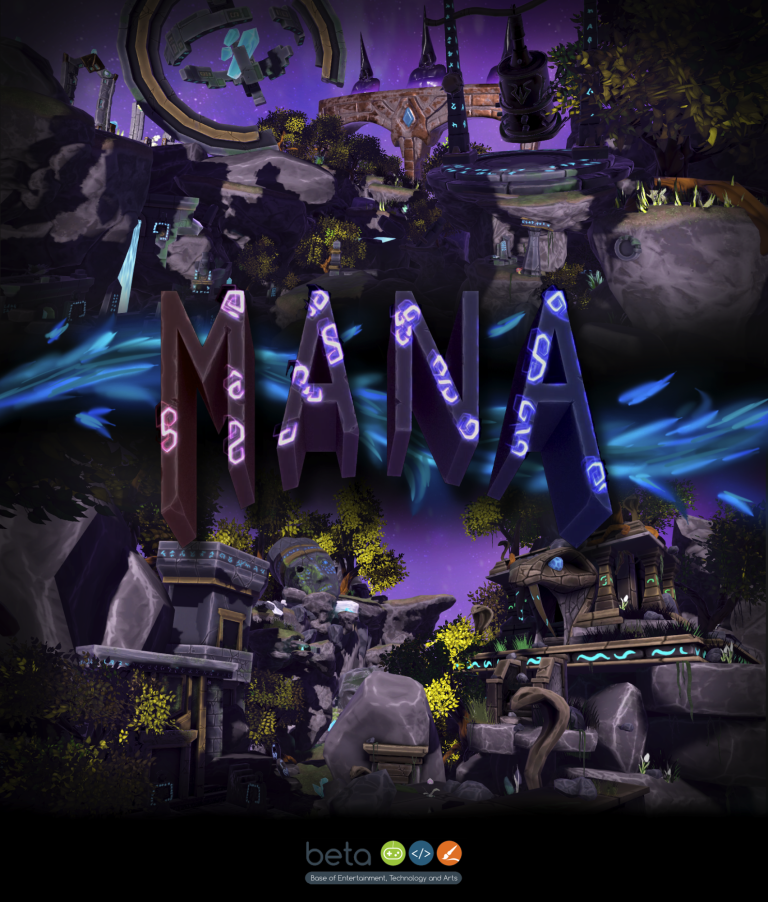
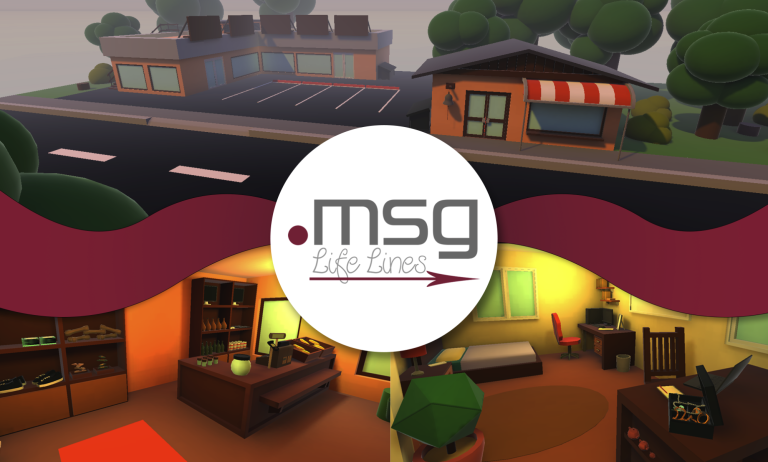
.msg-LifeLines (2019-2020)
A Real-Life Simulation for Identifying Personal Goals in a Virtual 3D Environment
The goal of LifeLines was to determine the personal needs and life goals of an interested person in a virtual 3D environment as close as possible to real life situations and expressly without the use of classic forms. This information can be used to initiate counselling offers for the financial protection of personal goals. This includes offers for property and health insurance.
The user can move through a virtual environment in first-person perspective and interact with it. The data collected in the process is used to generate a property profile of the anonymised user. With the help of the game engine Unity3D, this everyday simulation was developed for the WebGL platform. The results of the prototype created in the process are part of the next further developments. In addition to the technical tasks, great importance was attached to agile project management.
msg is an independent, internationally active group of companies with more than over 9,000 employees worldwide. The msg systems ag forms the core of the group.
Team: 2 Developers, 2 Game Designers/Artists
Role: Developer and 3D-Art
- Implemented core gameplay logic and interactive systems for a serious game prototype
- Developed in-game data collection systems for player behavior tracking
- Contributed to feature planning and UX iteration
- Low Poly 3D-Model creation